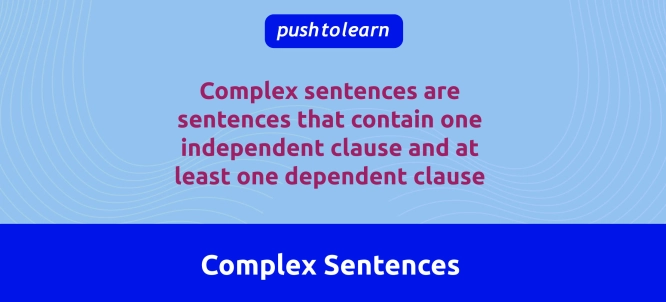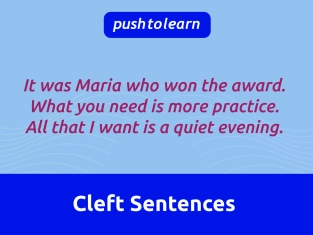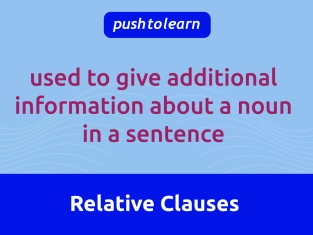by PushtoLearn
Complex Sentences Examples
Table of Contents
- Complex Sentences - B1 Exercise
- What is a Complex Sentence?
- Structure of a Complex Sentence
- Common Subordinating Conjunctions for Complex Sentences
- Examples of Complex Sentences
- How to Make Complex Sentences
- More Examples of Complex Sentences with Explanations
- Complex Sentence Practice
- Summary Table of Complex Sentence Parts
- FAQ
Complex Sentences - B1 Exercise
This exercise focuses on Because, Since, Although, When, If, While, Unless, or After
What is a Complex Sentence?
A complex sentence has:
-
An independent clause (a complete sentence that can stand alone).
-
A dependent clause (a group of words that provides extra information but cannot stand alone as a sentence).
The dependent clause often begins with words like because, if, when, although, since, while, or unless.

Structure of a Complex Sentence
Complex sentences can begin with either the independent clause or the dependent clause. If the sentence begins with a dependent clause, it is often followed by a comma before the independent clause.
Examples of Structure:
-
Dependent clause, Independent clause.
-
"Because it was raining, we decided to stay indoors."
-
Independent clause Dependent clause.
-
"We decided to stay indoors because it was raining."
Common Subordinating Conjunctions for Complex Sentences
Subordinating conjunctions are words that introduce dependent clauses. Here are some common ones:
|
Conjunction |
Example Sentence |
|
Because |
"She left early because she wasn’t feeling well." |
|
Since |
"Since he was tired, he went to bed early." |
|
Although |
"Although it was late, we kept studying." |
|
When |
"When the movie ended, everyone clapped." |
|
If |
"If you study hard, you will pass the test." |
|
While |
"While I was cooking, my friend called me." |
|
Unless |
"You won’t succeed unless you work hard." |
|
After |
"After we finished dinner, we watched a movie." |
Examples of Complex Sentences
Because
-
"I brought an umbrella because it looked like it might rain."
-
"She went to bed early because she was very tired."
-
"He didn’t go to the party because he had to work."
See also Can You Start a Sentence with Because?
Since
-
"Since he loves animals, he decided to become a veterinarian."
-
"Since it was getting late, we decided to go home."
-
"Since you are new here, I will help you get started."
Although
-
"Although she was tired, she stayed up to finish her homework."
-
"Although it was raining, they continued playing soccer."
-
"Although he studied hard, he didn’t pass the test."
When
-
"When we arrived at the park, it started to rain."
-
"When I called her, she was already asleep."
-
"When he saw the dog, he smiled with joy."
If
-
"If you help me with my project, I’ll finish faster."
-
"If it snows tomorrow, we will stay home."
-
"If you are hungry, there is food in the kitchen."
While
-
"While they were hiking, they found a beautiful waterfall."
-
"While I was reading, the phone rang."
-
"While the teacher was speaking, the students took notes."
Unless
-
"You won’t improve unless you practice every day."
-
"He won’t pass the test unless he studies harder."
-
"Unless it stops raining, we can’t go outside."
After
-
"After he graduated from college, he traveled to Europe."
-
"After I finish my homework, I will watch a movie."
-
"After the meeting ended, everyone went to lunch."
How to Make Complex Sentences
-
Choose an Independent Clause (a complete sentence).
-
Example: "I stayed home."
-
Add a Dependent Clause that provides extra information.
-
Example: "because I was feeling tired."
-
Combine the Clauses with a Subordinating Conjunction.
-
Final Complex Sentence: "I stayed home because I was feeling tired."
More Examples of Complex Sentences with Explanations
-
Independent Clause First:
-
"She loves reading books when it’s raining outside."
Explanation: "She loves reading books" is the independent clause, and "when it’s raining outside" is the dependent clause providing additional information. -
Dependent Clause First:
-
"Although he studied hard, he didn’t pass the exam."
Explanation: "Although he studied hard" is the dependent clause, followed by the independent clause "he didn’t pass the exam." -
Using Multiple Dependent Clauses:
-
"When the sun sets and the sky turns pink, the beach looks beautiful."
Explanation: There are two dependent clauses here ("When the sun sets" and "the sky turns pink") that lead to the independent clause, "the beach looks beautiful." -
Using Conditional (If):
-
"If it rains tomorrow, we will stay inside and play board games."
Explanation: The dependent clause "If it rains tomorrow" sets a condition, and "we will stay inside and play board games" is the independent clause.
See also Zero and First Conditional -
Adding Reason (Because):
-
"She brought extra water because it was a hot day."
Explanation: The independent clause is "She brought extra water," and the dependent clause is "because it was a hot day."
Complex Sentence Practice
Try making complex sentences by joining an independent clause with a dependent clause. Use subordinating conjunctions like because, although, if, when, since, while, and after.
Example Prompts:
-
Join these clauses:
-
Independent Clause: "I went to bed early."
-
Dependent Clause: "since I was feeling tired."
-
Complex Sentence: "I went to bed early since I was feeling tired."
-
Create a Complex Sentence using "because":
-
Independent Clause: "She wore a sweater."
-
Dependent Clause: "because it was cold outside."
-
Complex Sentence: "She wore a sweater because it was cold outside."
Summary Table of Complex Sentence Parts
|
Component |
Description |
Example |
|
Independent Clause |
A complete thought that can stand alone |
"I stayed home." |
|
Dependent Clause |
Adds extra information but cannot stand alone |
"because it was raining." |
|
Subordinating Conjunction |
Words like because, although, when, since |
"Since it was cold, I wore a jacket." |
|
Complex Sentence Structure |
Combines independent and dependent clauses |
"While I was cooking, my friend called me." |
FAQ
What’s the difference between an independent and a dependent clause?
An independent clause can stand alone as a sentence, while a dependent clause needs an independent clause to make sense.
Do I always need a comma in complex sentences?
Use a comma when the dependent clause comes first (e.g., "If it rains, we will stay inside."). No comma is needed if the independent clause comes first.
Can a complex sentence have more than one dependent clause?
Yes! Complex sentences can have multiple dependent clauses, like "When the sun sets and the stars appear, the night looks beautiful."
What are subordinating conjunctions?
Subordinating conjunctions connect a dependent clause to an independent clause. Common ones include because, if, when, although, and since.
Why use complex sentences?
Complex sentences make writing more interesting and detailed, as they allow you to add explanations, reasons, and extra information.

